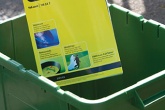Reduced collections will spark English recycling rate - SUEZ
 Consistency in collection services across local authorities, less frequent collections and an enforced ‘pay-as-you-throw’ scheme are among the solutions to England’s lagging household recycling rate, according to a new report from waste management company SUEZ.
Consistency in collection services across local authorities, less frequent collections and an enforced ‘pay-as-you-throw’ scheme are among the solutions to England’s lagging household recycling rate, according to a new report from waste management company SUEZ.
The report, ‘At this rate… Exploring England’s recycling challenges’, will be unveiled at the RWM exhibition tomorrow afternoon (15 September) by David Palmer-Jones, Chief Executive Officer of the recycling and recovery UK division of SUEZ and Alban Forster of SLR Consulting, who authored the report.
It seeks to explore what England has to do, ‘both in policy and operational terms’, to achieve a ‘step-change’ in the national recycling rate.
The English rate of household recycling experienced a huge upturn in the first 10 years after the turn of the millennium, rising steadily from 12.5 per cent in 2001 to 41.2 per cent in 2010.
However, since then progress has stalled, with an increase from 2012 to 2013 of just 0.1 per cent. This led to the Department for Environment, Food & Rural Affairs (Defra) admitting that an EU target of 50 per cent by 2020 could be missed.
As part of the study, researchers examined the country’s best-performing local authorities and sought to determine the impact of various social, geographic and demographic factors on recycling rates.
It also looked at other nations in the European Union to see what lessons can be taken from them.
Barriers to English recycling improvement
The study found that a number of factors are having a negative effect on England’s recycling rate.
The greatest barrier to progress remains household recycling, with levels of recyclable material put out for kerbside collection ‘significantly lower’ than in the best-performing European countries. This is particularly the case, the report suggests, for food, plastics and textiles.
The report identifies that this is is exacerbated by a limited proportion of English households being provided collection systems for ‘major recyclables’ like metals and paper.
Inadequate yields from multi-occupancy dwellings (apartment blocks), along with garden waste from rural authorities distorting recycling league tables and a lack of policy levers were also highlighted in the report as holding back England’s recycling progress.
Report recommendations
A number of recommendations for addressing the stagnant recycling rate are laid out in the report, including:
- the government piloting pay-as-you-throw schemes and introducing a mandatory requirement for separate collection of food waste;
- creating consistency in the type of materials collected from households for recycling;
- decreasing the frequency of residual waste collection;
- minimising contamination through communications and enforcement;
- developing measurements and metrics for reuse;
- incentivising the segregation of recyclables in treatment contracts;
- creating a clear policy framework with long-term certainty; and
- reintroducing mandatory recycling targets at local authority level.
The report claims: ‘If all English local authorities adopted the practices of their best-performing English counterparts, England’s household waste recycling rate would rise from 45 per cent to 56 per cent.
‘Optimum rates can be achieved if local authorities focus on maximising recycling yields from multi-occupancy dwellings’.
The report also questioned the suitability of tonnage-based targets, which it says encourages local authorities to target heavier materials like green waste over more valuable or complex ones like flexible laminated packaging.
Suggestions for alternative metrics to describe the value of recyclate include avoided energy use, avoided CO2 equivalent and monetary value.
Time to meet 2020 EU target running out
Chief Executive Officer of SUEZ recycling and recovery UK David Palmer-Jones said: “We believe that this report provides England’s local authorities and wider policymakers with a blueprint for raising our household recycling rate to the next level.
“These actions and recommendations place the 50 per cent target within reach, but the big question is whether the country’s policymakers and waste managers can implement the necessary changes in the short time we have available before the 2020 deadline.”
Alban Forster, Director at SLR Consulting, added: “This report highlights how critically important it is now to identify pragmatic solutions to improving England’s recycling levels to 2020, as well as stimulate a broader debate around what should be next for European circular economy policy.”
Read ![]() ‘At this rate… Exploring England’s recycling challenges’.
‘At this rate… Exploring England’s recycling challenges’. 










